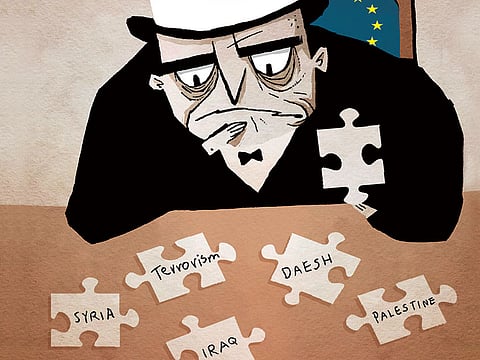Arab political thought must overcome ambiguity
From now on, Europe cannot look away from the problems of the Arab world, which have changed in nature as a result of recent events

The frightful events that occurred week before last in Tunisia, Somalia, France and Kuwait were perpetrated, according to the culprits, “in the name of Islam”. Nobody doubts that genuine Islam has nothing to do with such a rogue misunderstanding. Many Muslim clerics have said it. But the silence of some others is deafening. Incidentally, has anyone recently heard from Yousuf Al Qaradawi?
What is heard in Europe, inversely, are the usual, biased dialectics between those who say that the terrorists “cannot be considered Muslims” — as some Imams reiterated in France and Tunisia, where 80 mosques were nevertheless shut down by the authorities — and others who make the usual connection between Islam and terrorism, through the Muslim Brotherhood or salafists or Al Qaida or Daesh (the self-proclaimed Islamic State of Iraq and the Levant).
Actually, many Europeans would like the Arabs to start reflecting more intensively on the links between religion and politics. An interesting example is the latest book by Lebanese Professor Georges Corm, Thinking and politics in the Arab world. While doing so, they would not miss the movement of extremists from Europe to Syria to fight the secular regime of Syrian President Bashar Al Assad. As expected, they are returning home (including under the guise of political migrants), and have decided to strike in such a way that local security forces can hardly prevent the attacks. One is reminded of Arab youth who were trained and sent to Afghanistan in the name of Muslim solidarity in the 1980s to fight against the Soviets at a time when Palestinians were suffering in the very heart of the Arab world.
They would also link what is happening in Iraq, Syria and elsewhere to terrorism. Is the ‘Arab political thinking’ prepared to discuss the matter openly, so that it can offer proper solutions? Looking at some of the ambiguities prevailing in the region, one may be tempted to answer ‘not yet’. But when will the tragedies — such as those in eastern Saudi Arabia last month and in Kuwait week before last — be enough to widen the debate?
From now on, Europe cannot look away from the problems of the Arab world, which have changed in nature as a result of what has occurred in Tunisia and Libya. Europe has come under attack from some in its closest southern neighbours. What should its response be?
When France intervened in Mali, two years ago, to prevent Al Qaida from expanding in Western Africa, it sent troops on the ground and it fought hard. It did it nearly alone, and some analysts claimed France was playing its usual ‘colonial game’ — let us hope such commentators did not have relatives enjoying vacations in Sousse. But France cannot do that again this time.
Daesh is a mighty enemy and seems to have hardly been affected by the air campaign against it. It has huge financial means. Its presence is a threat to the entire region, as Kuwait found out last week. In Iraq, military experts say that a 10,000-strong force on the ground could probably solve the problem. But who will do that? The US has other preoccupations. In the Middle East, America is willing to make a nuclear deal with Iran and move on. At some point, one could even wonder whether they are actually willing to ‘fight’ terrorism or are content to just ‘manage’ it.
It is probably the increasing absence of the US (and Britain) from the battlefield, together with the non-existent foreign policy of the political dwarf that is Europe, that France has moved recently into two directions.
First one was a meeting organised early last month in Paris with representatives of 50 countries, aimed at “fighting terrorism”. Iran was not invited. There is no need to elaborate further if one of the actors best equipped to fight Daesh is not even welcome.
The second initiative was a mission led by French Foreign Minister Laurent Fabius, aimed at relaunching the peace process between the Palestinians and Israelis. There was the usual and unsurprising answer from Israeli Prime Minister Benjamin Netanyahu: “Israel will never accept a solution imposed from outside.” Even though a resolution will finally be presented to the UN in September, it cannot go ahead without US support.
It is one thing to fill in the gap, but quite another to have an Arab policy. As analyst Richard Labeviere put it in a recent interview with Lebanese newspaper L’Orient Le Jour: “In [Charles] De Gaulle’s times, France used to have an Arab policy. It now has a Sunni policy with business deals as its main feature.”
Syria, Iraq, Libya, Tunisia, terrorism, Palestinian-Israeli conflict ... everything is increasingly connected. “Information, by nature, goes along with lies,” wrote Ibn Khaldoun at the end of the 14th century. This is why ‘Arab political thinking’ should try and overcome any kind of ambiguity. As long as there are enough people in the world who believe that beheading an innocent in the name of religion or slaughtering dozens of others because they do not think as you do are monstrous crimes, it remains a strong message for hope.
Luc Debieuvre is a French essayist and a lecturer at Iris (Institut de Relations Internationales et Strategiques) and the Faco Law University of Paris.



